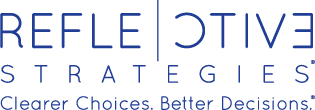I Can See Clearly Now
Approaching her 80th birthday, a friend mentioned that she was “more herself” now than she was when she was 35. It was a casual but deeply profound comment, which she delivered with a joyful smile. I asked her what this meant, exactly. Her response was even more profound: I can see the whole thing more clearly.
We Live in Parts, in Pieces
We work. We play. We family. We serially “do” throughout the day, week, year.
In fact, we spend the first half of our lives putting the pieces together, accumulating our roles and their accompanying responsibilities. Then we spend the second half pulling them apart and shedding the skins we’ve carefully layered until we’re back to where we started—hopefully, more wholly ourselves and less a collection of our doings.
In both acquiring and relinquishing our accumulated identities—mom, dad, daughter, son, boss, colleague, caregiver, neighbor—we struggle to achieve and keep them straight, on track, and on balance. This takes time and mental exertion and can bring stress, anxiety, and self-doubt along for the ride given our fractured, frenetic lives.
Our Lives are More Complicated than Ever
Boundaries were once much clearer—now we mix and match the many roles we play throughout the day and week. Working from home, flexible hours, and job sharing mean that we’re running the blender on “grind” and the off switch doesn’t work.
Both wonderful and terrible, technology has allowed this to happen; work rules and social conventions have followed in the wake. We are always on; our work is demanding more of our attention because invasive technologies like smart phones and wearables make it possible.
To add insult to injury, social media means that we now have many places where we can compare how effectively we play our roles in relation to the people we consider to be our friends and peers. Most of us find ourselves lacking; this comparison causes further stress and makes us even less effective.
We carry that stress as we shift from one role to another. If you have a bad start to the day with your family, you bring that negative energy into your first business meeting. Or if you have a stressful day at work, you bring it home with you.
Working with a Coach can Help
My initial focus as a strategic advisor and executive coach to corporate clients was to help with professional development and career advancement. Now, my work has expanded. It’s become clear that the problems I’m being asked to advise on are not strictly (or, even, primarily) professional in nature. My clients have increasingly been asking how they can meet their obligations to others and themselves, act authentically regardless of the role they are playing, and find greater fulfillment in their lives.
My personal coaching work now deals with challenges my clients—who range from young entrepreneurs to mid and late career executives at all levels— are having across the roles that they play. How do talented people work most effectively within the constraints that surround them and with the gifts they possess?
Today’s challenges relate to finding balance, setting boundaries, overcoming barriers to being most effective in whatever life situations they encounter, and, most importantly, to integrating all their life roles into a unified whole.
Reflecting our changing and challenging lifestyles, a new coaching discipline has emerged in the last fifteen years—health and wellness coaching—which takes a more holistic approach to ensuring we can be our best selves across all the many roles that we play. I’ve recently become certified as a health and wellness coach and am a fellow of the Institute of Coaching, MacLean Hospital, a Harvard Medical School Affiliate.
We Can Find Balance
Here are some of the essential questions that we should all be asking as we find ourselves trying to make it all work:
• What are the life roles I need and choose to play and why?
• Do I readily accept the role or is even some small part of me resisting it and, thereby, draining my energy and focus?
• What do these roles entail, day-to-day?
• What are my underlying, positive motivations in each role setting?
• What is the right balance across roles?
• What are the most productive and satisfying mind sets to accompany the roles?
• What environmental conditions (at home, work, play) can I create to more comfortably move among the roles?
• What behaviors/actions can/should flow from these mindsets?
• How can I find the space I need to enable greater awareness—of myself and others—in order to grow?
• Even as I “do” how can I also “be,” setting time aside to be my authentic self and find greater peace of mind in the process?
These questions help guide a shared exploration of what it means to be one’s best self now—to find balance between the practical and tactical parts of life and achieve our greater aspirations for professional growth and personal contentment.


